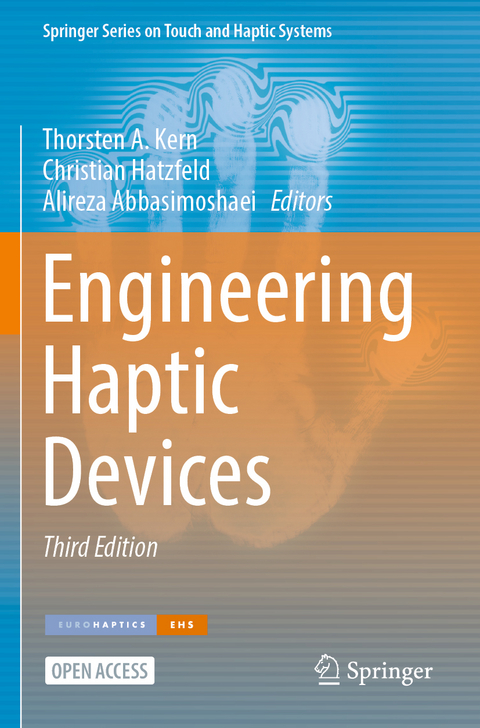
Engineering Haptic Devices
Springer International Publishing (Verlag)
978-3-031-04538-7 (ISBN)
This is an open access book.
In this third edition of Engineering Haptic Devices the software part was rewritten from scratch and now includes even more details on tactile and texture interaction modalities. The kinematics section was improved to extend beyond a pure knowledge explanation to a comprehensive guideline on how to actually do and implement haptic kinematic functions. The control section was reworked incorporating some hands-on experience on control implementation on haptic systems. The system, actuator and sensor design chapters were updated to allow easier access to the content.
This book is written for students and engineers faced with the development of a task-specific haptic system. Now 14 years after its first edition, it is still a reference for the basics of haptic interaction and existing haptic systems and methods as well as an excellent source of information for technical questions arising in the design process of systems and components.
Following a system engineering approach, it is divided into two parts with Part I containing background and reference information as a knowledge basis. Typical application areas of haptic systems and a thorough analysis of haptics as an interaction modality are introduced. The role of users in the design of haptic systems is discussed and relevant design and development stages are outlined. Part II presents all related challenges in the design of haptic systems including general system architecture and control structures, kinematics, actuator principles and all types of sensors you may encounter doing haptic device development. Beside these hardware and mechanical topics, further chapters examine state-of-the-art interfaces to operate the devices, and hardware and software development to push haptic systems to their limits.
lt;b>Thorsten A. Kern received his Dipl.-Ing. and Dr.-Ing. degrees from Darmstadt University of Technology (TUDA), Germany in the fields of actuator and sensor development for medical human-machine-interfaces (HMIs) in applications like minimally-invasive surgery and catheterizations. He is currently a director at Hamburg University of Technology, Germany, of the Institute for Mechatronics in Mechanics. He previously worked in Automotive Industry at Continental as a R&D manager for interior components, leading a team of 300 engineers worldwide. He joined Continental in 2008 covering various functions with increasing range of responsibility in actuator development, motor-development and active haptic device development before shifting towards R&D management and product-management on Head-Up-Displays. Between 2006 and 2008 he was working in parallel in a startup focussing on medical interventions and was finalizing the 1st edition of "Engineering Haptic Devices". He joined Hamburg University in January 2019. His interests are specifically focussed on all types of electromagnetic sensors and actuators and their system-integration towards larger motor- or sensor-systems in high-dynamic applications.
Christian Hatzfeld joined the Institute of Electromechanical Design of Technische Universität Darmstadt as a research and teaching assistant in 2008 working in the group of (Measurement and Sensor Technologies) of Prof. Dr.-Ing. habil Roland Wertschützky. He received his doctoral degree in 2013 for a work about the perception of vibrotactile forces. Then he was the leader of the "Haptic Systems" group until his death in 2018. His research interests included development and design methods for task-specific haptic systems and the utilization of human perception properties to alleviate the technical design. He was the main editor of edition 2 of Engineering Haptic Devices and contributed significantly to a large number of chapters specifically focussing on psychophysical topics.
Alireza Abbasimoshaei is currently a researcher assistant at the Institute for Mechatronics in Mechanics at the Hamburg University of Technology in Germany. Before joining iMEK, he designed and built four robots and controlled them. The last one was at the Technical University of Braunschweig in Germany. He filed two patents for rehabilitation devices and sold a finger rehabilitation robot he developed to a hospital partner. He also developed a new control system for rehabilitation robots in the field of control. He is an expert in mechatronic system design with special emphasis on mechanical and control system design.
Foreword.- Preface.- List of Contributors.- Part I Basics.- Motivation and Application of Haptic Systems.- Haptics as an Interaction Modality.- The User's Role in Haptic System Design.- Development of Haptic Systems.- Part II Designing Haptic Systems.- Identification of Requirements.- General System Structures.- Control of Haptic Systems.- Kinematic Design.- Actuator Design.- Sensor Design.- Interface Design.- Haptic Software Design.- Evaluation of Haptic Systems.- Examples of Haptic Systems Development.- Conclusion.- Impedance Values of Grasps.- Appendix.
| Erscheinungsdatum | 08.11.2022 |
|---|---|
| Reihe/Serie | Springer Series on Touch and Haptic Systems |
| Zusatzinfo | XXIX, 687 p. 466 illus., 238 illus. in color. |
| Verlagsort | Cham |
| Sprache | englisch |
| Maße | 155 x 235 mm |
| Gewicht | 1086 g |
| Themenwelt | Mathematik / Informatik ► Informatik ► Betriebssysteme / Server |
| Informatik ► Software Entwicklung ► User Interfaces (HCI) | |
| Informatik ► Theorie / Studium ► Künstliche Intelligenz / Robotik | |
| Technik ► Elektrotechnik / Energietechnik | |
| Schlagworte | Design Methodology • haptic interaction • Haptic System Design • open access • Psychophysic Content • Virtual Reality Systems |
| ISBN-10 | 3-031-04538-6 / 3031045386 |
| ISBN-13 | 978-3-031-04538-7 / 9783031045387 |
| Zustand | Neuware |
| Informationen gemäß Produktsicherheitsverordnung (GPSR) | |
| Haben Sie eine Frage zum Produkt? |
aus dem Bereich


